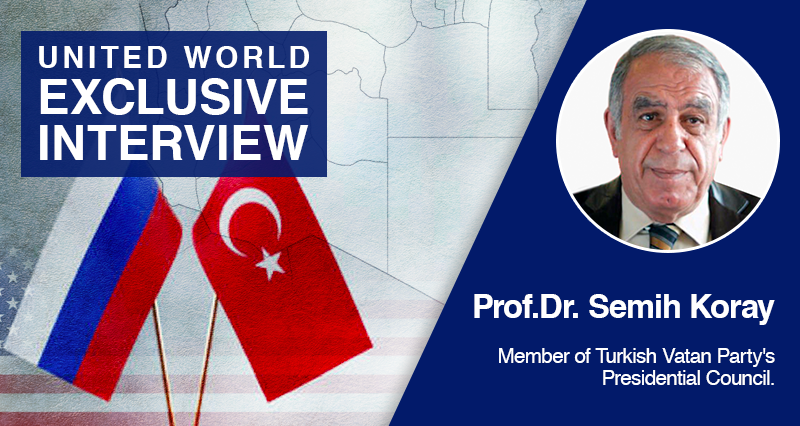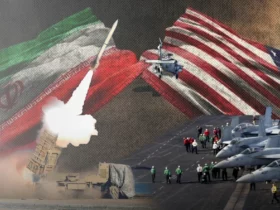On the southern side of the Mediterranean, Libya keeps on being in a political limbo. General elections are scheduled for December 24, but the Tobruk-based House of Representatives already postponed these for a month. The legislative base of the elections, including the question who will be permitted to candidate for the presidency, cause debate.
Western countries headed by the US are pressuring to hold the elections on time. They also increasingly pressure especially Turkey and Russia, calling them “external powers”, to retreat all forces from Libyan soil.
We have interviewed Prof. Dr. Semih Koray, Member of the Presidential Council of Turkey’s Vatan Party, on the US position, Turkey and Russia’s role and the importance Libya can achieve on a global scale.
How do you evaluate the US position in Libya?
First of all, we witness the days of the global decline of US hegemony. The United States is not capable to establish an order in countries where it intervenes. The most recent example is Afghanistan, where the US had to retreat after 20 years of occupation and failed nation building.
“The US is unable to establish order, thus, it only seeks division for at least limited control”
The United States is unable to establish a sustainable order under its control. Another example for this incapacity is the project of Greater Middle East Plan, which failed exactly because the US was not able to establish an order. Washington toppled down the Saddam Hussein government of Iraq, occupied the country, occupied afterwards parts of Syria, but without achieving a stable, sustainable order.
In consequence, the US attempts to divide the countries, to fracture them and to maintain on that way a limited control over at least parts of them.
Libya is of course another example, where the US has organized and led the toppling down of Muammar Ghaddafi. Here again, the US faces its own incapacity of establishing control and order over the whole country. In other words, the US cannot unite Libya. Thus, it prefers the country’s division.
The United States and its allies insist that Turkey and Russia give up their influence in Libya. How do you evaluate this?
The US position on Libya is part of Washington’s general strategy. Washington faces on the global level the rising force of, what I would call the Front of Humanity, comprised of countries such as Russia, Turkey and also of the People’s Republic of China.
The US strategy pursues a certain strategy against the Front of Humanity. Washington constantly searches for weaknesses in that front and tries to create conflict and strife.
In that sense, Washington considers Libya as another opportunity to create tensions and conflict between Turkey and Russia, as these two countries have taken the opposing sides in the conflict. Washington’s approach in that sense resembles the situation in Syria.
Should the US achieve a tactical gain in Libya by creating Turkish-Russian tensions, it would be heartened to pursue a generally more aggressive policy.
What should Turkey and Russia do in Libya?
Turkey and Russia are both surrounded by US presence and threats, both in Libya and in other areas such as Syria, the Black Sea, the Aegean or the Baltic Sea. Therefore, their main interest lies in keeping the US and its allies afar.
“Excluding the US is point of departure for Turkish-Russian agreement”
Hence, the point of departure for both countries is searching for solutions in Libya that exclude the US and its allies. If Ankara and Moscow search for these solutions, they will find them. To repeat the point above: the US has not interest in a united and stable Libya, but Turkey and Russia do have such a goal.
Additionally, there is a strong awakening against US and French imperialism in a broad range of countries, such as Algeria, Guinea or Mali. And rising up against the US and France, all these countries consider Russia and Turkey as their natural allies. This supports the Turkish-Russian alliance in Africa, which can constitute an example of success in the struggle against colonialism and imperialism.
You state that Libya can constitute an example. Can you explain this?
Of course. We are living in times where the US as a regressing power is destructive, while the rising powers, such as Turkey, Russia and China are constructive. We are at the edge of a multipolar world.
“Agreement in Libya will accelerate US decline and progress to multipolar world”
In that context, if Russia and Turkey jointly succeed in establishing order in Libya, they will not only accelerate the regress of the US further; they will also prove the claim of a multipolar world.
Therefore, a Russian-Turkish cooperation in Libya will have results far more that in this country, affecting the global balance of power.

















Leave a Reply